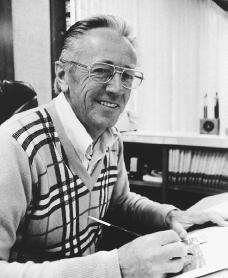PEANUTS
 Charles Monroe Schulz was born in Minneapolis, Minnesota, on November 26, 1922, the son of Carl and Dena Halverson Schulz. His father was a barber. Charles loved to read the comics section of the newspaper with his father and was given the nickname "Sparky" after Sparkplug, the horse in the Barney Google comic strip. From an early age, Schulz loved drawing and practiced by copying his favorite comic strip, Popeye.
Charles Monroe Schulz was born in Minneapolis, Minnesota, on November 26, 1922, the son of Carl and Dena Halverson Schulz. His father was a barber. Charles loved to read the comics section of the newspaper with his father and was given the nickname "Sparky" after Sparkplug, the horse in the Barney Google comic strip. From an early age, Schulz loved drawing and practiced by copying his favorite comic strip, Popeye.
He was a shy teenager, perhaps as a result of skipping a grade which made him the youngest in his class at Central High School, in St. Paul. One sad episode in his high school life was the rejection of his drawings by his high school yearbook. However, a five-foot-tall statue of Snoopy was placed in the school's main office 60 years later.
In 1943, Schulz served in the Army as a squad leader on a machine gun team. After being discharged in late 1945, Schulz returned to Minneapolis where he did lettering for a comic magazine, Timeless Topix, In 1946, took a job at Art Instruction, Inc., reviewing and grading lessons submitted by students. He worked at the school for a number of years while he developed his career as a comic creator, until he was making enough money to be able to do that full-time.
Schulz's first regular cartoons, a weekly series of one-panel jokes entitled Li'l Folks, were published from 1947 to 1950 by the St. Paul Pioneer Press. In 1948, Schulz sold a cartoon to The Saturday Evening Post; the first out of 17 one-panel cartoons by Schulz that would be published there. In 1948, he tried to have Li'l Folks syndicated through the Newspaper Enterprise Association. Schulz would have been an independent contractor for the syndicate, unheard of in the 1940s, but the deal fell through. Li'l Folks was dropped from the Pioneer Press in January 1950.
Later that year, Schulz approached the United Feature Syndicate with the one-panel series Li'l Folks, and the syndicate became interested. However, by that time Schulz had also developed a comic strip, using normally four panels rather than one, and reportedly to Schulz's delight, the syndicate preferred this version. Peanuts made its first appearance on October 2, 1950, in seven newspapers. The weekly Sunday-page debuted on January 6, 1952. After a somewhat slow beginning, Peanuts eventually became one of the most popular comic strips of all time, as well as one of the most influential.
At its height, Peanuts was published daily in 2,600 papers in 75 countries, in 21 languages. Over the 50 years that Peanuts was published, Schulz drew nearly 18,000 strips. During the life of the strip, Schulz took only one vacation, a five-week break in late 1997 to celebrate his 75th birthday; reruns of the strip ran during his vacation, the only time reruns occurred while Schulz was alive. Unlike many other successful cartoonists, Schulz never used assistants in producing the strip; he refused to hire an inker or letterer, saying that it would be equivalent to a golfer hiring a man to make his putts for him. He never allowed other artists to draw his characters for the multitude of products that were sold under the Peanuts line, feeling that his line quality could not be copied with any success. When Schulz was approached to produce animated Peanuts specials for television, he made an exception to that rule and allowed the award winning animator, Bill Melendez, to draw his characters. They became close friends and won many awards for their collaborations.








